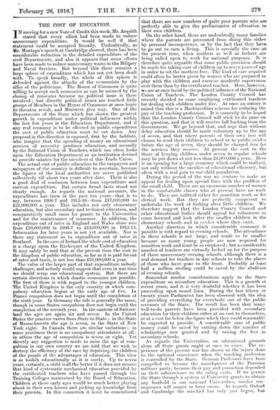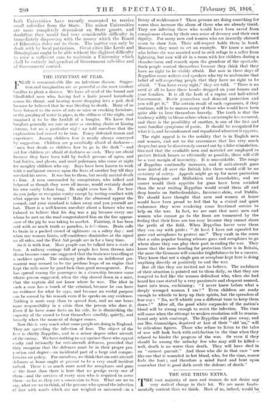THE COST OF EDUCATION.
IN moving for a. new Vote of Credit this week, Mr. Asquith stated that every effort had been made to reduce unnecessary expenditure. It would be well if that statement could be accepted literally. Undoubtedly, as Mr. Montagu's speech at Cambridge showed, there has been considerable reduction in the detailed expenditure of the civil Departments, and also it appears that some efforts have been made to reduce unnecessary waste in the Military and Naval Services. But beyond this there remains a large sphere of expenditure which has not yet been dealt with. To speak broadly, the whole of this sphere is defended against the attacks of the economists by the rifles of the politicians. The House of Commons is quite willing to accept such economies as can be secured by the closing of museums because no political issue is there involved ; but directly political issues are touched little groups of Members in the House of Commons at once begin to threaten revolt, and Ministers give way. One of the Departments of the State which has shown the greatest growth in expenditure under political influences within the last few years is the Education Department, and if any real economy is to be effected in public expenditure the cost of public education must he cut down. Any proposal in this direction is opposed, first by the faddists, who imagine that the spending of money on educational services of necessity produces education, and secondly by the National Union of Teachers, which too often looks upon the Education Department as an institution devised to provide salaries for the members of this Trade Union. The actual cost of public education to the taxpayers and ratepayers of the country is difficult to ascertain, because the figures of the local authorities are never published collectively till about two years after date. There is also a good deal of confusion between loan expenditure and current expenditure. But certain broad facts stand out clearly enough. As regards the national accounts, the expenditure has risen in the past ten years—that is to say, between 1906-7 and 1915-16—from £17,000,000 to £21,000,000 a year. This includes not only elementary education, but also secondary and technical education, and comparatively small sums for grants to the Universities and for the maintenance of museums. In addition, the expenditure out of rates in England and Wales alone rose from £10,000,000 in 1906-7 to £13,000,000 in 1912-13. Information for later years is not yet available. Nor is, there any statement as to expenditure out of rates in Scotland. In the case of Ireland the whole cost of education is a charge upon the Exchequer of the United Kingdom. It may safely be said that at the present time the cost to the kingdom of public education, so far as it is paid for out of rates and taxes, is not less than £36,000,000 a year. The value of the larger part of that expenditure nobody challenges, and nobody would suggest that even in war time we should scrap our educational system. But there are certain directions in which drastic economies are possible. The first of these is with regard to the younger children. The United Kingdom is the only country in which com- pulsory education begins at the early age of five. In France compulsion does not begin until the completion of the sixth year. In Germany the rule is generally the same, though in some States compulsion does not begin until the completion of the seventh year. In the cantons of Switzer- land the ages are again six and seven. In the United States the practice varies from State to State ; in the State of Massachusetts the age is seven, in the State of . New York eight. In Canada there are similar variations ; in some provinces there is no compulsory attendance at all in others the age of compulsion is seven or eight. Yet directly any suggestion is made to raise the age of com- pulsion in our own country we are told that we wish to destroy the efficiency of the race by depriving the children of the people of the advantages of education. This view is as foolish educationally as it is costly. Up to seven years. certainly, a child is all the better if it does not receive that kind of systematic mechanical education provided by the certificated teachers who have passed through the Training Colleges maintained by the Board of Education. Children at these early ages would be much better playing about in their own homes and picking up knowledge from their parents. In this connexion it must be remembered that there are now numbers of quite poor parents who are :perfectly able to give the preliminaries of education to 'their own children.
On the other hand, there are undoubtedly many families where the parents are prevented from doing this either by personal incompetence, or by the fact that they have to go out to earn a living. This is specially the case at the present. time, when mothers as well as fathers are being called upon to work for national purposes. - It is therefore quite arguable that some public provision should be made for taking_care of children up to seven years of age in order to set the mothers free. The kind of care required could often be better given by women who are prepared to play with the children and exercise motherly supervision over them than by the certificated teacher. ' Here, however, we are at once faced by the political influence of the National. Union of Teachers. The London County Council has recently decided to cease employing certificated teachers for dealing with children under five. At once an outcry is raised that this is a Machiavellian scheme for reducing the pay of the teaching profession. It is earnestly to be hoped that the London County Council will stick to its guns on this question, and that it will receive full backing from the Government. We go beyond that, and urge that without delay education should be made voluntary up to the age of seven, and that where parents of their own free will choose to send their children to school or to public.cri:ches before the age of seven, they should be charged fees for the 'services. they receive. At present the cost to the State of keeping. children under seven in regular schools may be put down at not less than £4,000,000 a year. .Here is an opening for a large economy which could, be realized, not only without the sacrifice of educational efficiency, but often with a real gain to our child population. • • During the period of the war we venture to make an appeal for dealing upon special lines with the problem of the small child. There are an enormous number of women in the comfortable classes who at present have no work to do. They are unfitted either for munition work or for clerical work. But they are perfectly competent to undertake the work of looking after little children. We therefore suggest that the London County Council and other educational bodies should appeal for volunteers to come forward and look after the smaller children in the elementary schools and in cth'iies where they exist. - Another direction in which considerable economy is possible is with regard to evening schools. The attendance in these schools is not large, and tends to be smaller because so many young people are now required for munition work and must be so employed ; hut a considerable number of teachers are virtually locked up for the purpose of these unnecessary evening schools, although there is a real demand for teachers in day schools to take the places of those who have gone to the front. Probably. at!least half a million sterling could be saved by the abolition of evening schools.
Somewhat similar considerations apply to the State expenditure on secondary education. • This is a growth of recent years, and it is very doubtful whether it has been proceeding upon sound lines. During the last fifteen or twenty years Parliament has been obsessed with the idea of providing everything for everybody out of the public revenues of the State. The result has been that many well-to-do parents have been provided with secondary education for their children either at no cost to themselves, or at a cost far below the figure which they could reasonably be expected to provide. A considerable sum of public money could be saved by cutting down the number of scholarships now granted and by raising the ices in secondary schools. As regards the Universities, on educational grounds alone all State grants ought at once to cease. The ex- perience of the present war has shown us the injury done to the national conscience when the teaching profession is controlled by the State. German Professors have been compelled to become the mouthpieces of the Prussian military party, because their pay and promotion depended on their subservience to the ruling caste. If we permit the State through a system of University grants to obtain any foothold in our national Universities, similar con- sequences will sooner or later ensue. As regards Oxford and Cambridge the mischief has only just begun, 'but both Universities have recently consented to receive small subsidies from the State. -; The minor Universities are more completely dependent on State grants, and doubtless they would find very considerable difficulty in immediately dispensing with the money which the Board of Education doles out to them. The matter can only be I teal t with by local patriotism. Great cities like Leeds and Birmingham ought to be able without the slightest difficulty to raise a sufficient sum to maintain a University which ;ball be entirely independent of Government subsidies and of Government control.



































 Previous page
Previous page